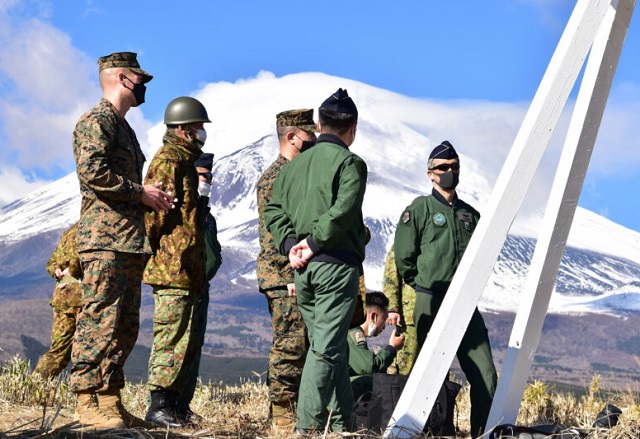Indian leaders always preferred close strategic cooperation with Russian authorities politically, economically and militarily, making US its second priority.
by Asad Ali
Realist School of Thought says there are no permanent friends and foes in global politics. The ultimate objective of every state is to protect its own national interests by using offensive and defensive postures. And, there is no concept of morality when it comes to international relations. These words best suits Indian government and its policymakers. The people, in the helm of affairs in India, are trying to protect political, economic and strategic interests of the country, by setting aside decade old bilateral ties and moral values. Historically speaking, Indian foreign policy had remained non-aligned. It refused to choose sides during cold war era, when world was divided in bipolar groups – one headed by US while was led by former Soviet Union – now Russia. Yes, it is a well-established fact that leaders in New Delhi maintains close strategic ties with Russia in order to acquire most sophisticated military equipment, aimed at deterring Pakistan.
Indian leaders always preferred close strategic cooperation with Russian authorities politically, economically and militarily, making US its second priority. Indian and Russian leaders often visits both countries for annual summit. In response to its close strategic cooperation with India, Russia provides New Delhi with the best available state of the art military hardware. However, due to the developing geo-strategic environment of the world, the priorities of Indian establishment are varying under premier Modi. Since last few years, India’s strategic bonding with US has been increasing drastically. The recent strategic shift in the region compelled US to get closer to India just to keep an eye on its competitors such as Russia and most importantly China.
Both India and US have same strategic objectives in the region, which we called South Asia and Southeast Asia. They wanted to contain the rise of China and Russia in the region. To accomplish its strategic objectives in the region, both US and India are cooperation strategically with each other. Moreover, India’s strategic bonhomie with Russian and Chinese rival US is creating sense of losing strategic pivot for both Russia and China. Therefore, both states have increased their regional outreach by garnering maximum support from regional countries particularly Pakistan. The fall of Kabul, tension in Persian Gulf, growing US presence in the region and other regional development brought Pakistan closer to Russia and China. India’s intimacy with US is also major cause for convergence of interests between Russia, China and Pakistan.
Likewise, Indian government is seeking more support from US to act against China and its ultimate rise, which India considers dangerous in order to accomplish its self-created dream to become regional hegemon. To accomplish this self-created dream, Indian leaders have sided with US, which is not a good omen for New Delhi’s long term foreign policy goals. The growing US presence in Indo-Pacific Region is also not good for regional peace as well because it is likely to create chaos and strategic competition in the region. Furthermore, Indo-US approach containment of China is also being viewed as creating divides in the region. These acts will also disturb balance of power in the region.
Russia for its part, has been uncomfortable with growing Indo-US strategic partnership and especially recent cooperation between Quad states including US Japan and Australia. In September 2021 when the first in-person Quad leaders’ summit occurred, Russian top diplomat Lavrov alleged that Western state and US are trying to engage India in anti-China games by promoting Indo-Pacific strategies.
In Russian context, the recent shift in India’s foreign policy priorities is crucial for Moscow’s strategic objectives in the region. Overall situation in Russian neighborhood, fall of Kabul, are major concern for Moscow and its policymakers as they have to deal with both India and US at a same time. India sided with US at a critical juncture, which proves realist school of thought right. Interestingly, India supported US over the recent Russia-Ukraine standoff, a move which has wounded Russian policymakers. During a vote at UNSC on whether to hold an official session to discuss Ukraine crisis, India, along with some other non-permanent members of UNS, refused to support US-led push for meeting by abstaining.This Indian incident is part of a larger pattern in New Delhi’s actions that presents challenges to American neo-primacy.
Likewise, Indian political and foreign affairs experts have warned Modi’s government of consequences due to its unilateral approach towards US. But, the time will decide who’s at par in this strategic competition. For Pakistan, this is the best time to get closer to Russia, mending historical differences. Policymakers in Islamabad should capitalize this opportunity and get political, economic and strategic support from Russia. Prime Minister Imran Khan’s decision Russia at this time is right and strategic move, which is likely to enhance cooperation between two states. After the fall of Kabul, Pakistan is once again getting international and regional pivot to play crucial role in Afghanistan. Islamabad must grab this opportunity to get maximum relief from international community to acknowledge its sacrifice and provide more economic leverage to the country. For Russia, it is right time to expand its strategic bonding with Pakistan, keeping in view Indo-US strategic bonhomie. Now, it is the best time for the trio of Pakistan-Russia-China to lead this region and play crucial role in making this region peaceful and economically strong. Indian quest for becoming regional hegemon will never met its real fate.
The writer is Islamabad based expert of Indian affairs and can be reached at asadmalik2008@gmail.com












Post a Comment